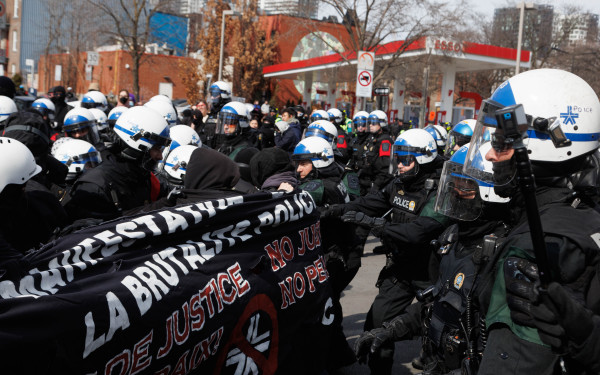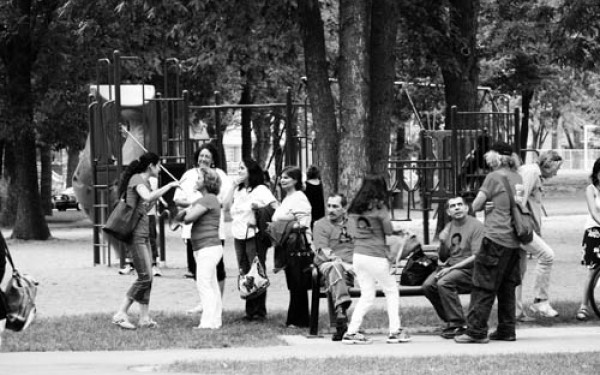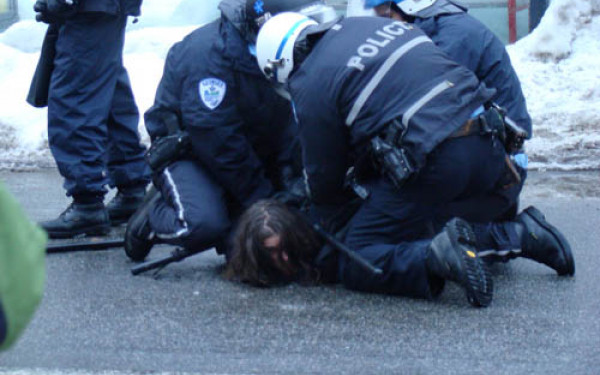Montreal Police Need to Better Respond to Campus Sexual Assaults
Last year, in the quaint West Island town of Saint-Anne-de-Bellevue, a young woman was sexually assaulted at John Abbott College while walking down a hallway with someone she knew.
The story followed a fairly typical narrative of on-campus assault cases. The victim reported and waited, but to little avail. When the press picked up her story, she stated that the Service de Police de la Ville de Montréal had failed to complete a thorough investigation and dismissed her case after accusing her of lying.
The SPVM’s rejection of the case was criticized by many, and raised several questions regarding their training, but justice for the victim has yet to be served and the perpetrator continues to walk free.
When it comes to sexual assault, the Montreal police does not have a particularly competent image. In a piece written by Annabelle Blais for La Presse, a representative from the SPVM was quoted as saying that women should “refrain from taking taxis alone while under the influence” to prevent sexual assault at the hands of taxi drivers.
Even though that statement came from 2014, the notion of sexist police officers in the city of Montreal is anything but new. In 1989, in another La Presse story, Suzanne Colpron wrote that sexual harassment was rampant within the SPVM, explaining that male officers often victimized their female colleagues. Colpron referred to a poll conducted by the organization Travail Non Traditionnel, which concluded that, out of the 250 female police officers that participated in the survey, 62 per cent of them were victims of sexual harassment in the workplace.
Not unlike the instance of the SPVM’s taxi safety statement, victims of sexual assault are often subjected to “victim blaming” at the hands of Canadian police. This lack of empathy for victims creates an unsafe environment for other victims of sexual assault—discouraging them from coming forward, sharing their stories and putting their aggressors behind bars.
A survey conducted by the CBC in 2014 found that 16 Canadian post-secondary schools had zero reports of sexual assault for six consecutive years. While this may give the illusion that Canadian schools have low rates of on-campus sexual assault, it instead points to the fact that victims are often reluctant to report. In an anonymous survey of 43 people that was conducted for this story, seven said they had been sexually assaulted on campus. Of these seven, none had reported their case to school administration or police.
Considering the positive steps many campuses are taking in terms of sexual assault prevention and intervention, these statistics are disappointing. Some John Abbott College students said they believe their school has always been very efficient in providing helpful resources on campus. Beatrice Clarke, a John Abbott alumna, said the college has always done its best in keeping the campus safe.
“I remember, while I was attending [John Abbott], there was a brutal attack upon a woman on campus and it made us all very uneasy,” said Clarke. “The administration did a wonderful job as a result, in boosting security, especially after dark, and education about how to avoid terrible situations.”
Regardless of all the positivity surrounding counseling and consent education on campuses like John Abbott’s, a significant number of victims are still hesitant to report. Unsupportive rhetoric on campus and a lack of competence within the Montreal police are still large factors. John Abbott graduate Ariana Borjian said that last year’s case was not the first sexual assault she had heard about during her time at the college.
“The objectification of women and catcalling on school grounds is a daily affair,” said Borjian. “The overall environment of John Abbott is not a safe one for sexual assault survivors because of the sexism and ignorance amongst students… The services seem to be there, but without peer support, it can be extremely difficult for a student to bring himself or herself to consult them.”
Nicole Common, a 2009 graduate, said that her experience at John Abbott also failed to be conducive to safety or prevention.
“I think the way that certain events are hyper-sexualized is not helping the issue,” said Common. “Certain performances in the Agora and the way that certain speech was allowed… One [comedian] made such vulgar rape jokes that I got up and walked out.”
While not all students or faculty at John Abbott are fully engaged in promoting a safe space on campus, student Nathalie Wong says there’s still hope for the future.
“Although the victim did not receive justice from the police, administration and staff, she did receive a lot of support from students,” said Wong, referring to a petition started by Concordia University student Elizabeth Hanley. The petition calls for apologies, justice and progress, and has received more than 1,800 signatures.
The plague of sexual assault on campus is not a new phenomenon. Whether it is within the SPVM, school administrations or the students themselves, it is becoming increasingly obvious that change is imperative. As a former member of It Happens Here, Dawson College’s sexual assault awareness initiative, Catherine Duret says the best way to incite change is by showing support for victims and their stories.
“Sharing a personal and often traumatic story of assault—sexual or other—is, of course, no small task,” said Duret. “That is why, when people do come forth with these claims, it is so important to hear their story, respect it, and aid them in finding the help they need in order to go forward.”







